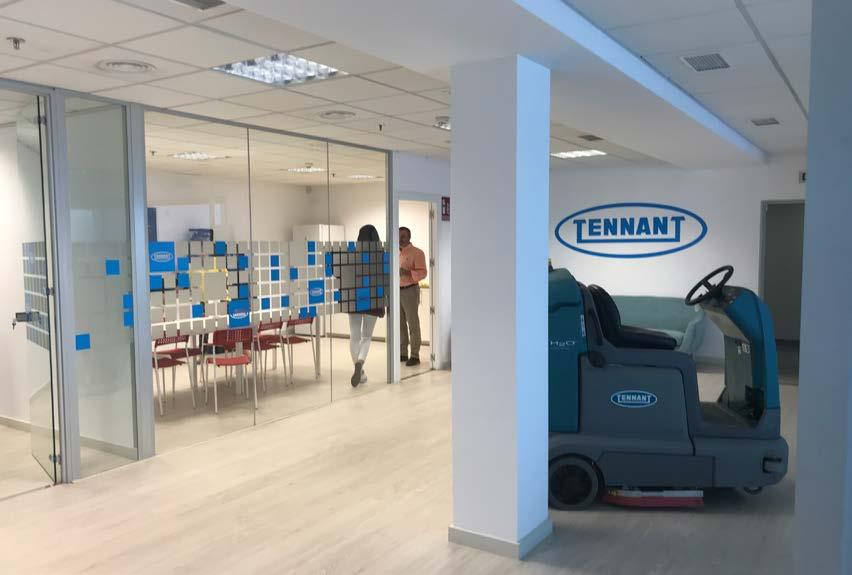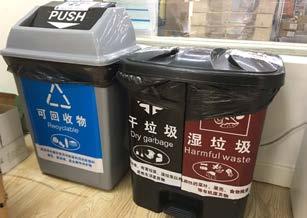
7 minute read
WASTE
FOCUS AREA: WASTE
At Tennant Company we strive to reduce—and eventually eliminate—all forms of waste, another pillar of our Sustainable Enterprise strategy.
Our aspiration is that all purchased materials provide the highest and best use attainable to our customers and all other stakeholders. This aspiration feeds our broad view of waste to include operational inefficiencies as well as material and resource waste. We define waste as materials that enter our boundary which do not become part of the products we sell.
Tennant Company continues to make progress toward becoming a zero-waste enterprise by applying the solid waste hierarchy of Reduce, Reuse, Recycle, along with the proven principles of Lean Manufacturing and Continuous Improvement. Through our stakeholder engagement process in 2013, we determined that waste is a material issue, since all forms of waste have cost implications. As we have continued to engage with our stakeholders, waste remains a primary area of concern, especially for customers and employees.
In 2014, Tennant set an aspirational goal of zero waste to the landfill or disposal. The Solid Waste Management Hierarchy prioritizes our waste reduction and diversion tactics. Waste sorts at our facilities have identified current state and highlight areas of opportunity. Our actions include: collecting organics at our corporate headquarters, incorporating additional recycling containers throughout the production facility in Golden Valley, and increasing our diversion of cardboard and stretch wrap at our distribution centers. We continue to expand and improve our industrial recycling as employees identify waste streams that should be diverted. In 2019, we collected over 4,500 metric tons of industrial recycling material, a 12.5% increase over 2018. Our employees regularly identify ways to reuse materials and reduce waste, including reusing incoming dunnage on outbound shipments and working with procurement and engineering to reduce excess packaging or material before components are delivered to our facilities.
FOCUS AREA: WASTE
WATER
Water, which we use as efficiently as possible in our operations, is a critical resource. A water materiality assessment of Tennant Company’s Minneapolis, MN, campus was completed by Wenck Associates Inc. Based on the results, we concluded that water in our operations is not a material aspect for setting goals and sustainability reporting. However, consistent with our core value of stewardship, Tennant Company will:
Strive to conserve water and eliminate any wasteful water use.
Maintain the highest possible discharge water quality in all global operations and all communities where we operate.

FOCUS AREA: WASTE
TENNANT GLOBAL HEADQUARTERS OFFICE FURNITURE RECYCLING
In spring 2019, planning began for a global headquarters where our Minneapolis-based teams could collaborate and grow, Tennant Company purchased an existing corporate campus in Eden Prairie, MN. The sale included a full complement of aging, traditionally configured furniture that did not contribute to the agile, collaborative workspace we’re building. This meant that we needed to remove 1,000 workstations and auxiliary furniture – enough to fill an estimated 80 trailers.
Tennant Company aspires to be a zero-waste-to-landfill organization, so we chose a partner to help us responsibly manage the used equipment left on the campus. We didn’t want to contribute to the 8.5 million tons of office assets the United States EPA estimates are sent to landfill waste annually. Our local partner has a long history of decommissioning office furniture, so we tapped into their large network to reuse the furniture we needed to remove as we remodeled the campus.
As our furniture partner described, decommissioning office furniture is nothing new and is increasingly included in purchase agreements of new furniture. In many instances, the furniture is still functional and in good-to-excellent working condition. However, if it is no longer in-line with current workplace design trends, it becomes more difficult to rehome full workstations.
There are many ways furniture can be decommissioned or redeployed. In this case, the furniture has been donated to different non-profit organizations and schools in Minnesota and Wisconsin, after a stop at a refurbishing firm for rework to make the furniture functional for the new user. None of the furniture acquired with the purchase of the property contributed to landfill waste in 2019.
Source: https://cleantechnica.com/2017/11/07/a-hidden-waste-issue-8-5-million-tons-of-office-furniture-goes-to-landfills-annually/
1,000 WORKSTATIONS
NON-PROFIT & SCHOOL DONATIONS IN MINNESOTA & WISCONSIN
0%
CONTRIBUTED TO LANDFILL WASTE
ISO 9001 CERTIFICATION
Tennant Company is committed to quality.
An unrelenting commitment to quality management is in the DNA of Tennant Company. Our guiding principle of innovation leadership demonstrates this dedication, as we strive to "be recognized as our industry's innovation and quality leader."
To continue to improve our quality, we are consistently working to achieve ISO 9001 certifications for our operations. The most recent addition is the commercial equipment factory located in Holland, Michigan. Earning the ISO 9001 certification was no easy feat; the quality, production, materials and management teams worked hard for two years to define, solidify and confirm processes and procedures that teams follow rigorously to exceed customer expectations.
The team performed a full analysis of processes and procedures, identifying some that needed to be rebuilt from the ground up. This included the important challenge of getting all the processes, new and old, documented completely. Employees, including leadership, were then trained on the new ways of doing things. Next, the Holland site was audited internally to verify compliance to the ISO standards. To accomplish this, the quality manager identified 10 employees who became internal auditors. These employees completed, and passed, a one-week course by a certified training organization before they began to audit the Holland, MI, site. Six internal audits were completed in 2018 and 2019 to help set up the site for success. Finally, over the course of the week-long external audit by NSAI auditors, 50 employees were interviewed, and the facility earned their certification.
Tennant Company is proud to share that our Holland, MI, facility is now ISO 9001 certified and look forward to continuing to certify more facilities in the future.
FOCUS AREA: WASTE
TENNANT COMPANY QUALITY POLICY
Tennant Company is committed to exceeding customer expectations and to meeting regulatory and quality management system requirements. All employees are dedicated to continuous innovation and improvement in all aspects of our business. Revered for its legacy of quality management, Tennant Company and its employees are unwavering in sustainment of this policy.
FOCUS AREA: WASTE
MADRID ISO 14001 CERTIFICATION
Tennant Company Madrid Sales and Service Office
Tennant Company’s customers in Spain frequently ask about quality and environmental management certifications. The Spain Sales team responded to this trend early, achieving ISO 9001 certification for the Sales & Service location in Madrid since 2011 and ISO 14001 since 2012.
Seven years of business growth in Spain finally required the Madrid office to move the Sales office to a separate location from the Service Center in 2018. This move created more space for service and training, but added complexity to the ISO audit processes. The environmental management certification, ISO 14001, includes environmental regulation and recordkeeping, energy use, and emissions tracking. Reporting and recordkeeping requirements changed after the move because the two locations are in different municipalities, each with different rules regarding environmental management. 2019 was a recertification year. Lola Valero and Veronica Gomez, who are both on Tennant Spain’s Service Team, successfully maintained the ISO 9001 and 14001 certifications despite the audit’s concurrence with two large projects: the IPC Integration and localization of Customer Service. Valero and Gomez share their passion for the environment with the team by training new employees on Tennant Company’s sustainability approach. The continued certification, progress, and training of employees has become an advantage in the face of our competitors in the environmentally conscious Spanish market.

FOCUS AREA: WASTE
RECYCLING IN QINGPU
Tennant Company’s aspirational goal to be zero-waste-to-landfill began in 2014. Our facilities across the globe have been working hard to help us achieve this goal.
In 2019 the manufacturing plant located in Qingpu, China, which manufactures Tennant-branded products, began a comprehensive sorting program. Their waste is now sorted into four different categories: recyclables like bottles and cans, wet or kitchen waste, dry waste, and hazardous waste. The team set up sorting stations around the facility, with labels and signs so employees know what goes where. Tennant looks forward to continued progress toward our goal to become zero waste to landfill.

Tennant Manufacturing Plant, Qingpu, China Tennant Manufacturing Plant, Qingpu, China

ANTWERP NEIGHBORHOOD CLEANUP
Antwerp, Belgium is home to Tennant Company’s European Headquarters. This past winter the team had a volunteer week, with one day dedicated to cleaning the neighborhood around the office. Thirtytwo employees in teams of two and three dispersed over lunch and collected 80 kg of litter. To accompany this collection, Tennant Company donated 500 EUR to MadeBlue to show our continued commitment to Sustainability and creating a cleaner, safer, healthier world.






